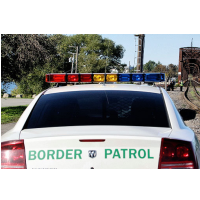Border Patrol Arrests Extend Hundreds of Miles from Border
 (AP Photo)
(AP Photo)
Perhaps they should change the name to the Inland Patrol.
The U.S. Border Patrol has been roaming farther into the interior of the country to stop and arrest those suspected of being in the United States illegally, according to a report by Jeremy Schwartz of the Austin American-Statesman. Many of those arrests are made on flimsy pretexts and end up ensnaring many with the right to be in the country.
Courts have ruled that the Border Patrol needs stronger justification for stopping people when they’re more than 100 miles from the border. However, officers in Texas have arrested people as far as 350 miles from the border with only the racial appearance of the arrestee as justification.
“You ask yourself: what else do (Border Patrol) agents have to go on besides race?” San Antonio immigration attorney David Armendáriz told the paper. “What does an immigrant without papers look like? Because your average immigrant without papers looks like your average Hispanic.”
The Border Patrol has done its best to keep its policies and arrests out of the public eye. The American-Statesman was able to get some information from a Freedom of Information Act request, but the agency wouldn’t say how many arrests were made outside the 100-mile line or how many stops were made of those with the legal right to be in the United States. The newspaper was able to talk to a former Border Patrol agent who said only about half the stops he made resulted in arrests, which meant that half were of those entitled to be in the country.
Judges have thrown out cases in which the stops were made on pretexts such as occupants of a car not looking at a Border Patrol car or the appearance of an arrestee. A judge dismissed the case of a Guatemalan man arrested because of the appearance of his “cheekbones, jaws, ears, and forehead.” The agent said those features gave the man the look of an “OTM,” or Other Than Mexican immigrant. Immigration Judge Glenn McPhaul wrote that the arresting agent couldn’t answer “how one Hispanic person might stand out from another as an illegal alien when the Hispanic population is so high in San Antonio.”
Other judges have given similar rulings on cases involving those arrested far from the border. A case in Washington state in which a stop was made “based on nothing other than the ethnic and/or racial appearance of a vehicle’s occupants” was settled with the Border Patrol agreeing to provide extra training to its area agents and to report the number of roving traffic stops for 18 months. In the year after the settlement, the Border Patrol made only seven such stops.
-Steve Straehley
To Learn More:
Border Patrol Makes Many Arrests Deep In the Heart of Texas (by Jeremy Schwartz, Austin American-Statesman)
Homeland Security Approves Seizure of Cell Phones and Laptops within 100 Miles of Border; Report Remains Secret (by Matt Bewig, AllGov)
- Top Stories
- Unusual News
- Where is the Money Going?
- Controversies
- U.S. and the World
- Appointments and Resignations
- Latest News
- Trump to Stop Deportations If…
- Trump Denounces World Series
- What If China Invaded the United States?
- Donald Trump Has a Mental Health Problem and It Has a Name
- Trump Goes on Renaming Frenzy






Comments